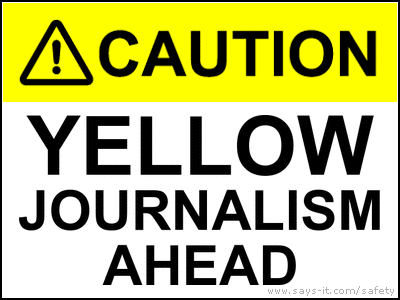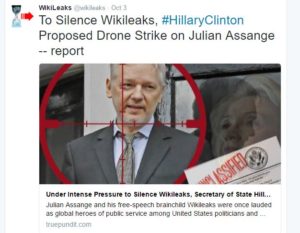 This post addresses the difference between spinning the news and yellow journalism. Spin is defined as “news and information that is manipulated or slanted to affect its interpretation and influence public opinion.” (www.dictionary.com) For example, presidential campaign surrogates, suggesting a $917 billion business loss in one year qualifies as “genius,” are the poster boys/girls for spin.
This post addresses the difference between spinning the news and yellow journalism. Spin is defined as “news and information that is manipulated or slanted to affect its interpretation and influence public opinion.” (www.dictionary.com) For example, presidential campaign surrogates, suggesting a $917 billion business loss in one year qualifies as “genius,” are the poster boys/girls for spin.
In contrast, yellow journalism ” is a type of journalism that presents little or no legitimate well-researched news and instead uses eye-catching headlines to sell more newspapers.” (Wikipedia) The term was first introduced when sensational and unsubstantiated reporting by newspapers such as the New York Journal (William Randolph Hearst, publisher) and the New York World (Joseph Pulitzer, publisher) was used during the Spanish-American War to increase circulation. Today, yellow journalism is practiced mostly by grocery store tabloids as when the National Enquirer suggested Ted Cruz’s father played a role in John Kennedy’s assassination.
In previous posts, I have focused my frustration about media coverage during this election cycle on CNN and MSNBC and have ignored Fox News. Why? Because I expected more from the first two news outlets. Why get upset when Sean Hannity, the host of one of Fox’s prime-time shows, appears in a Trump campaign ad or is offered as the sole source of the candidate’s otherwise undocumented opposition to the Iraq invasion? Spin is spin.
However, this morning Fox News and it’s latest partners Wikileaks and True Pundit crossed the line between spin and yellow journalism. Reporting on Julian Assange’s decision to appear via video at a news conference after claiming he feared assassination, Fox included the following in an article on its website.
Though no recent public revelations directly tie to Assange’s security fears, various U.S. officials and pundits have made threatening statements directed at him in the past. WikiLeaks on Monday tweeted an alleged quote from a 2010 State Department meeting at which then-Secretary of State Hillary Clinton asked if Assange could be killed in a drone strike. That same year, former Democrat strategist Bob Beckel said on Fox News Channel that “a dead man can’t leak stuff.”
Assange also has hinted that deceased DNC staffer Seth Rich may have been a source for WikiLeaks. Rich, 27, was found with multiple gunshot wounds to the back at a Washington, D.C., intersection in July. He died soon thereafter. Authorities believe Rich was the target of a botched robbery, but his death has inspired conspiracy theories.
These are bold accusations and, if true, might reasonably require voters to re-evaluate their presidential options. However, with one exception, none of the above is substantiated. The exception is the Bob Beckel quote. In 2010, in discussing how Wikileaks might endanger U.S. security, he did suggest Assange might be better off dead. And to their credit, Fox also identified Beckel as a “former Democrat strategist.” Other conservative and alt-right websites were not so accurate, labeling Beckel as a former Clinton strategist, something he has never been. For the record, there was bi-partisan condemnation of Beckel’s remarks. Moveon.org petitioned CNN, for whom Beckel is now a paid commentator, to fire him.
Just as one bad apple spoils the whole bunch, one kernel of truth does not justify mostly unsubstantiated reporting. First, the lead sentence refers to “various public officials and pundits.” Various implies several, yet Beckel is the only documented case.
Second, the only evidence of the alleged Clinton quote comes from an article in the alt-right on-line publication True Pundit. Yesterday, Wikileaks, as reported in the Fox News story, directed its followers to the story with the following tweet.

The article implied the threat was consistent with a November 24, 2010 email from the Department of State director of policy planning to Hillary Clinton with the subject line “an SP memo on possible legal and nonlegal strategies re wikileaks.” Here is the text of the email.
Following this morning’s meetings I activated my four legal eagles on the SP staff — Peter Harrell, Jen Harris, Bill Burke White, and Catherine Powell (that includes two law profs and two Yale law grads who certainly could be law profs). They in turn reached out to people at the Berkmann Center at Harvard and other experts, working together with Alec Ross. Alec has been particularly useful in terms not only of his knowledge but also his sensitivity to how anything we might try to do could impact our own internet freedom agenda. The result is the attached memo, which has one interesting legal approach and I think some very good suggestions about how to handle our public diplomacy. AM
As reported by Snopes.com, “The thrust of True Pundit’s article hinged almost entirely on claiming that the term “nonlegal” essentially means the same thing as “illegal.” Dictionary.com defines “nonlegal” as “not related to, qualified for, or phrased in the manner of the practice of law (distinguished from illegal).” A big difference. All the email suggests is that there may be legal options (e.g. seeking a cease and desist order) and nonlegal options (e.g. media campaign). The non-threatening nature of any suggestions for nonlegal efforts is affirmed by the use of the term “public diplomacy.” Finally, the memo includes a warning the department should do nothing that might negatively affect its own efforts to promote “internet freedom.” It is quite a stretch to imply this email responded to a Clinton suggestion involving assassination of Assange.
Third, the second paragraph undercuts everything Wikileaks and Assange espouse as the justification for the organization’s existence. They boast they have created a place where individuals can share sensitive information without fear of retribution. Even hinting who a source might be is a gross violation of that principle. When Assange raised the possibility Seth Rich might be responsibility for leaking the DNC emails, there was no evidence to substantiate his claim and it made for sensation headlines, the definition of yellow journalism. Wikileaks is now offering a $20,000 reward for information about Rich’s death. (NBC News, August 10, 2016) I am confident some of the same conspiracy theorists who believe Rafael Cruz assisted Lee Harvey Oswald are claiming the prize based on equally baseless assertions.
Why do I refer to Fox, Wikileaks and True Pundit as partners? As demonstrated in this case, these three entities use each others reporting to substantiate a story which otherwise lacks evidence. Why is that dangerous? Consider the “partnership” between the New York Times and the Bush administration leading up the Iraq invasion. On September 8, 2002, the Times published a story by Judith Miller and Michael Gordon about the existence in Iraq of aluminum tubes, whose use would be part of Iraqi programs to build nuclear and biological weapons. That same morning Cheney appeared on Meet the Press and quoted the story to support the justification for a possible invasion of Iraq. As we learned later, sources for the Times story where the very people who were citing it as evidence of Sadam Hussein’s nuclear ambitions. Simply put, representatives of the Bush administration planted a story in the Times which they later quote as third-party verification of their concerns about Hussein.
And exactly how did that work out?
For what it’s worth.
Dr. ESP
 This post addresses the difference between spinning the news and yellow journalism. Spin is defined as “news and information that is manipulated or slanted to affect its interpretation and influence public opinion.” (www.dictionary.com) For example, presidential campaign surrogates, suggesting a $917 billion business loss in one year qualifies as “genius,” are the poster boys/girls for spin.
This post addresses the difference between spinning the news and yellow journalism. Spin is defined as “news and information that is manipulated or slanted to affect its interpretation and influence public opinion.” (www.dictionary.com) For example, presidential campaign surrogates, suggesting a $917 billion business loss in one year qualifies as “genius,” are the poster boys/girls for spin.